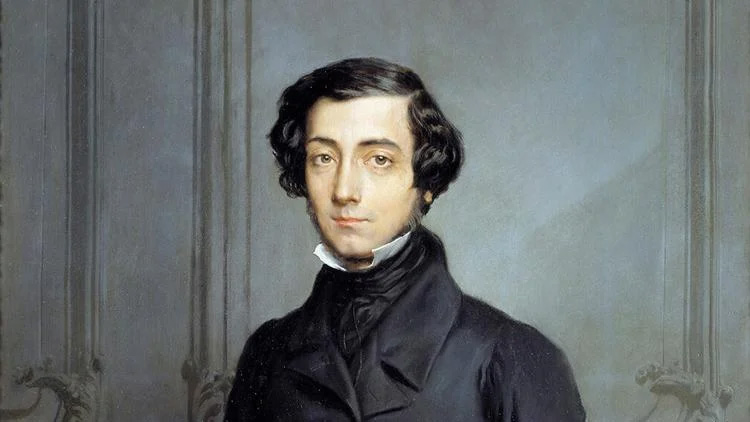
By Dakoda Pettigrew
Sep 3, 2025
 |
| Alexis de Tocqueville |
No one was more attuned to the burgeoning of American democracy than the curious Frenchman Alexis de Tocqueville. Traveling the United States during the age of Andrew Jackson—the age of democracy so repugnant to the old order of aristocratic republicanism—Tocqueville saw a fatal flaw in America, one that was (and still is) more than a little ironic.
Monarchy was gone, to be sure, and with it the order of society that sustained it; it had collapsed, quicker than many of the founders anticipated. Those who clung to the hierarchical remnants—men like Washington, Adams, and Hamilton, to name a few—came to their life’s end in a nation they barely recognized, if at all.
The spirit of democracy—a spirit they did not necessarily endorse in its fullness—had grown rapidly, leaving little, if any, room to adjust. It grew until it became strong and only grew stronger.
Tocqueville noticed something. He found that Americans had not really cast off tyranny at all—they had replaced the tyranny of monarchy with something just as frightening: the rule of the majority.
“In my opinion, the main evil of the present democratic institutions of the United States does not arise, as is often asserted in Europe, from their weakness, but from their overpowering strength,” he wrote in Democracy in America; “and I am not so much alarmed at the excessive liberty which reigns in that country, as at the very inadequate securities which exist against tyranny.”
The power of the majority in America, he wrote, was seemingly without noticeable bounds. It was almost like an unknown disease, seeping its way into every nook and cranny until it engulfed all things—until it became all things. And there seemed to be no redress.
“When an individual or a party is wronged in the United States, to whom can he apply for redress? If to public opinion, public opinion constitutes the majority; if to the legislature, it represents the majority, and implicitly obeys its injunctions; if to the executive power, it is appointed by the majority under arms,” and so forth.
Tocqueville added, almost humorously, that “however iniquitous or absurd the evil of which you complain may be, you must submit to it as well as you can.”
In America, Tocqueville noticed that even the rule of the majority as it concerned the ruled was much different than monarchy, at least as he understood it. “The authority of a king is purely physical, and it controls the actions of the subject without subduing his private will,” he explained.
Whereas “the majority possesses a power which is physical and moral at the same time; it acts upon the will as well as upon the actions of men, and it represses not only all contest but all controversy.”
Tocqueville called this reign of tyranny “legal despotism,” a kind of soft tyranny, in that it can be rendered almost without notice, and almost always without effective resistance. “I know no country,” he concluded, “in which there is so little true independence of mind and freedom of discussion as in America.”
True, the law protects free speech, but the majority does the policing of that free speech. Tocqueville wrote that in democracies like America, “the body is left free, and the soul is enslaved,” while “the majority lives in the perpetual practice of self-applause.”
Tocqueville went so far as to assert that America had yet to attain literary genius precisely because literary genius requires freedom of opinion, “and freedom of opinion does not even exist in America.”
The writer and speaker of opinion, he wrote, is too afraid of the majority to express his opinions. So “he yields at length, oppressed by the daily efforts he has been making, and he subsides in silence, as if he was tormented by remorse for having spoken the truth.”
How accurate Tocqueville’s observations about American democracy are a question still under investigation and debate, and perhaps always will be. What seems clear, however, is the remarkable degree to which his observations have rang true since the mid-nineteenth century.
From the slaveocracy of the Old South to the paranoia of McCarthyism, from the rise of Christian nationalism to the present day, the battle for control of the majority has seemed to involve supremacy rather than governance, fear rather than hope, and uniformity rather than compromise.
Friends have become enemies, ideas have become dangerous, and words have spilled over into violent action. Our democracy has indeed often acted out no differently than the despotism of that British parliament and crown from whom we declared independence.
This is nothing new. American democracy is human, after all, and, as James Madison understood, our American government is the greatest of all reflections of a fruitful yet fragile human nature.
But what has always been does not always have to be the indefinite future. The majority does not own our minds, our bodies, our souls, our hopes, our fears. It is only the constitutional mechanism of political action, and that action must be consistent with law as well as ideal, with letter as well as spirit.
Despotism enacted by a legislature, or signed off by a president, or approved by a high court is still despotism, and it is still ugly, wrong, and infinitely un-American. Whether we are the majority or the minority, we are all subject to one same set of rules, one same spirit of ideals, one same critical posterity, one same God of nature.
With Tocqueville’s words in our mind, let us press onward with the resolve to see American democracy be as pure as it can be, not sullied by the very things it was instituted to cast off and not impaired by the revisiting of old ghosts in new shapes. Above all, let us never subside in silence but speak principle to power, freedom to tyranny, justice to oppression, and peace to chaos.
